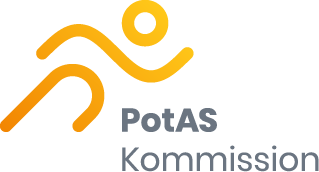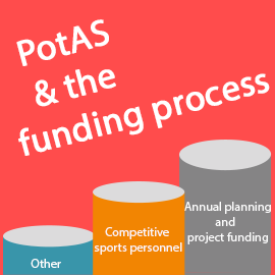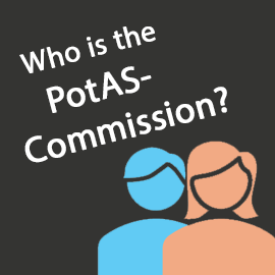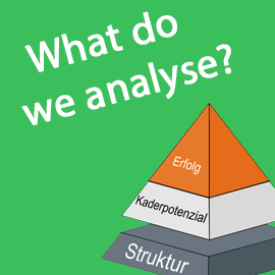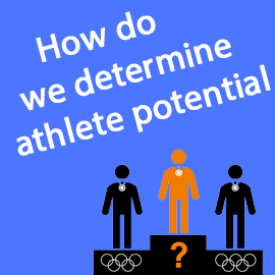
Fact Sheets
Evaluation system and procedure
The main task of the commission responsible for the potential analysis (PotAS) of German elite sports is to assess the Olympic summer and winter sports federations separately to provide a ranking for the sports federations with the greatest potential to achieve podium and top-8 placements at the next Olympic Games. The ranking shall be used to allocate funding to the sports federations. For this purpose, three pillars are evaluated: i) the sporting success, ii) the athletes potential for the next Olympic Games and iii) the organisational structures of the sports federations. This evaluation system was developed in various working groups including members of the German Olympic Sports Confederation (DOSB), the Federal Ministry of the Interior and Community (BMI), the national sports federations, the Institute for Applied Training Science (IAT) and the Federal Institute of Sport Science (BISp) and handed over to the PotAS Commission in 2017.
1. Sporting success
The objective and data-driven evaluation takes into account the annual target competitions (i.e., European and/or World Championships) two years before the Olympic Games and evaluates the performances of German athletes relative to the top three nations within a sports discipline. Besides the pre-Olympic sporting success, qualification performances for the Olympic Games and sporting success at the Olympic Games (podium and top-8 placements) are included in the assessment of sporting success.
2. Athlete potential
Until the 2020/2021 Olympic Summer Games in Tokyo, the assessment of athlete potential was expertise-driven and carried out by members of the national sports federations and the DOSB. These results were transferred to the PotAS Commission and integrated into the final report. For the 2022 PotAS-evaluation of the winter sports federations, a paradigm shift was implemented from an expertise-driven approach to a data-based procedure. The athlete potential for the next Olympic Games can now be estimated on the basis of raw data (Elo-scores) from the sports database Gracenote and customised algorithms. In brief, PotAS compares the discipline-specific performance development of German elite athletes with the development of all international athletes within a sport discipline. Thus, the current approach to evaluate athlete potential is objective, data-driven and expressed relative to the best athletes in the world within a specific sport discipline.
3. Federation structures
The evaluation of organisational structures of sports federations is based on specific criteria, such as talent identification and development (talent management), training programming and performance development (management of training and competition), good governance (sports federation leadership), sexual violence and abuse, anti-doping (health management). Two commission members independently evaluate the respective criteria according to their expertise. First, the commission members assess whether the existing concepts meet the standards of the DOSB, the national anti-doping agency (NADA), Transparency International, etc. In a second step, the sports federations must demonstrate that they have the appropriate personnel to implement the concepts. In a third step, the commission inquires about the internal procedural paths for implementing the concepts through the available personnel. In case the two commission members disagree with regards to their rating, the entire commission is called upon for a final decision. In order to sharpen the focus of the PotAS analysis, discussions are ongoing with the commissioning bodies to consider removing the structural evaluations from the PotAS-analysis for the new Olympic cycle from 2025 to 2028.
Final PotAS report
At the end of each Olympic cycle, the PotAS commission prepares a final report containing the results of the evaluation of the three pillars and hands it over to the commissioning bodies, BMI and DOSB. The report is used for further consideration in the structural discussions and with regards to the funding of the national sports federations. Currently, results from the PotAS-analysis are used by the funding commission to finance annual planning, while the funding of elite sports personnel remains unaffected by the results.
Criteria system
The data is collected by the Office of the PotAS Commission and entered into the PotAS data management system after the 2024 Olympic Games. The national sports federations do not have to process this main criteria.
- Percentage of the number of points achieved for places 1 to 8 at the 2024 Olympic Games in relation to the number of points achieved by the top three nations in the respective discipline/discipline group
Evaluation system for success criteria
The assessment of success criteria has been further developed. The focus of the success criteria is on the discipline-specific gap to the world's best. This is calculated from the average total score of the best three nations per discipline. The gap to the world's best is now calculated as the percentage ratio of the own result compared to the mean value described. If the own result is above the mean value, the maximum percentage value to be achieved is 100.
The evaluation is based on places 1-8 of each competition. Each nation represented is scored according to the following system:
1st place = 60 points
2nd place = 40 points
3rd place = 20 points
4th place = 10 points
5th place = 8 points
6th place = 6 points
7th place = 4 points
8th place = 2 points
If a nation is represented more than once, the points achieved are added together.
If a competition is assigned to several disciplines, the points achieved are divided by the number of disciplines (cross-discipline mixed competitions).
The data is collected by the DOSB, transmitted to the PotAS office and entered into the PotAS data management system. The national sports federations do not have to process this main criteria.
- Individual sports: Percentage of quota places achieved in relation to the maximum quota places achieved by the best nation in the discipline at the Olympic Games
- Team sports: Qualification of the national team for the Olympic Games
The data is collected by the Office of the PotAS Commission and entered into the PotAS data management system. The national sports federations do not have to process this main criteria.
- Percentage of points achieved for placings 1 to 8 in target competitions defined by the DOSB prior to the Olympic Games in relation to the number of points achieved by the best three nations in the respective discipline/discipline group
Evaluation system see main criteria 1
The data is entered by the PotAS office. The national sports federations provide a list of athletes who are categorised as potentially successful at the 2028 Olympic Games. The national sports federations do not need to process this main criteria.
Evaluation system
As part of the 2023/24 potential analysis for the summer Olympic sports federations, the athlete potential for the 2028 Olympic Games will be determined primarily with the help of the ‘Gracenote’ sports database.
Further information: Method paper on the Elo-based potential analysis 2024
Future or long-term sporting success is based on goal-orientated talent management. On the one hand, the management of young talent (identification, development) must define a guiding framework and, on the other hand, allow variable, mostly sport-specific design options. From a scientific and federation perspective, the development, implementation and evaluation of a well-founded and long-term strategy for the management of young athletes requires that concepts, measures and criteria for talented athletes are developed in advance, selected and promoted with and by qualified coaches and regularly coordinated, evaluated and further developed with those involved in the youth athlete sector.
Top sporting performance in elite athletes is based on training and competition management that enables targeted individual performance development on the basis of a framework training concept and specific testing, for which qualified coaches are responsible and which is systematically monitored, recorded and analysed. The evaluation of training and competition management is based on the regular analysis of international development trends.
The quality of elite sports federation management depends on the federation's management structure, the quality of the staff involved - both full-time and voluntary - and the federation's culture.
The DOSB concept for the ‘Professionalisation of elite sports personnel in the national sports federations’ sets out the required standard.
Personnel selection, personnel development and personnel qualification are key elements of the evaluation criteria. The remuneration concept for full-time and part-time positions influences the attractiveness of the respective position as well as employee satisfaction.
Good governance rules, including a sport-specific risk analysis, are intended to ensure the integrity and transparency of federation management and counteract undesirable developments.
The performance directors are responsible for the management of elite sports federations and the implementation of elite sport guidelines wherever national athletes and promising junior athletes train. Federation regulations and regional target agreements regulate the necessary details.
The position of the athletes' representatives within the federation's governance structure opens up active participation opportunities for those who are at the centre of sport: the athletes.
Competitive sport is dependent on sports facilities that meet the requirements for competitive training and competition. The relevant requirement profiles need to be professionally developed and refined.
Participation in international governing bodies is of particular importance for the further development of national sports federations, competition structures and their rules and regulations and for the protection of federation-specific interests.
Coaches are an essential prerequisite for sporting success at a top level because they are responsible for managing the performance development of their athletes. The national sports federations are therefore required to establish structures that enable the optimal qualification of their coaching staff. Firstly, this includes the conceptual definition and implementation of measures for coach qualification, coach recruitment and the deployment of coaches. In the context of coach qualification, particular consideration should be given to the fact that successful coaching requires professional, social, methodological and strategic competences, which must be taken into account accordingly in the training and further education programmes. Secondly, it must be structurally ensured that the task of coach qualification in the federation is linked to appropriately qualified and full-time employees. And thirdly, a competence team should be set up to deal with the ongoing development of coach qualification, facilitate coordination between national sports federations and state associations and promote collaboration between national and state coaches.
Athletes can only perform at their best if they are physically and mentally healthy. Optimal physiotherapeutic, psychological and medical care is an essential prerequisite for practicing elite sports in a healthy way. To this end, it must be ensured that these services are coordinated and harmonised within the national sports federations via adequate procedures. This requires a conceptual definition and the implementation of measures by qualified employees. Communication with the athletes must be continuously adapted.
Professional support for national athletes includes an annual basic sports medical examination and basic sports psychology support as well as nutritional advice. In addition, athletes have to deal with anti-doping guidelines on a daily basis. In order to relieve the athletes of this burden, the national sports federations must actively educate them about these regulations, advise them and support them in using the anti-doping platform ADAMS.
It must also be ensured that the national athletes are able to practise their sport in a safe, physically and psychologically non-violent environment.
An optimal, reliable and clearly organised training and competition environment makes it easier for national athletes to concentrate fully on their performance. The less they have to deal with administrative issues, the better. This requires a conceptual definition and the implementation of measures to make the lives of elite athletes easier.
The athlete survey initiated by PotAS revealed that, in addition to good medical and physiotherapeutic care, national athletes are primarily concerned with financial concerns, the compatibility of sport and education (dual career), the specific organisation and support of trips to competition, including transparent squad and nomination criteria and optimal training facilities. This includes the need for a clearly named and qualified contact person in the federation, the athlete coordinator, who can provide advice on the various topics, as well as active federation marketing. The better the federation markets itself, the more the national athletes participate financially and the more sponsors can be attracted through increased public awareness. A transparent overview of the rights and obligations of the federation and national athletes, along with openly communicated nomination criteria, contributes to greater athlete confidence in planning their season and career. In addition, good competition traveling management helps the national athletes to focus on their core tasks when preparing for competitions.
All these procedures and the communication with the national athletes must be continuously adapted by the national sports federations.
Success in elite sports is based, among other factors, on early adoption - meaning the immediate implementation of new scientific knowledge. Firstly, this includes the conceptual definition and implementation of scientific support services and research and development projects as well as the ongoing safeguarding of knowledge transfer. Secondly, it must be structurally ensured that the task of scientific management in the federation is linked to appropriately qualified and full-time employees. And thirdly, a competence team must be set up to deal with new knowledge requirements and transfer measures on an ongoing basis and to promote cooperation with the ‘Coach Qualification’ department.
